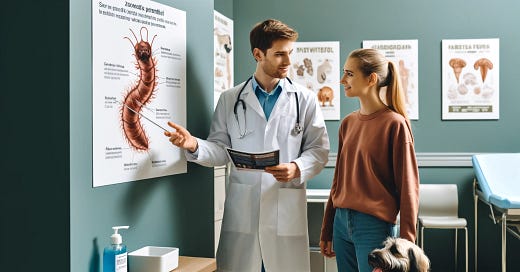The Importance of Informing Pet Owners About the Zoonotic Potential of Giardiasis
Keeping pet owners informed about the zoonotic potential of giardiasis is essential for preventing the spread of this parasitic infection.
Understanding the health risks of owning pets is crucial for every pet owner. One such risk is giardiasis, a parasitic infection caused by the Giardia parasite. This infection can be transmitted from animals to humans, making it a zoonotic disease. Educating pet owners about the zoonotic potential of giardiasis is essential for safeguarding human and animal health.
Giardiasis primarily spreads through contaminated water and food or contact with infected feces. Pets, especially dogs and cats, can carry the Giardia parasite without showing symptoms. This asymptomatic nature of the infection increases the risk of transmission to humans. Ensuring pet owners are aware of these risks can significantly reduce the chances of an outbreak.
In addition to the direct health impact, giardiasis can cause significant discomfort and illness in humans. Symptoms include diarrhea, abdominal cramps, nausea, and fatigue. These symptoms can be particularly severe in young children, older adults, and individuals with compromised immune systems. It's crucial to understand that giardiasis is not just a mild inconvenience but a potentially serious health threat, especially for these vulnerable populations. By informing pet owners about the signs and preventive measures, we can protect these individuals from the potential harm of this infection.
Preventive measures are straightforward but require consistency. As a pet owner, you have the power to protect your pet and your family from giardiasis. Practice good hygiene, such as washing hands thoroughly after handling pets or cleaning up after them. Regular veterinary check-ups can help detect and treat giardiasis early, and proper sanitation of pet living areas is also crucial. Furthermore, educating yourself about the importance of clean water and safe pet food practices can help prevent giardiasis.
Moreover, veterinarians are your trusted partners in this educational effort. During routine visits, they should actively inform you about giardiasis, including discussing preventive measures and answering any questions you may have. They can also provide resources for further learning, such as pamphlets, websites, and community workshops, which can be practical tools for disseminating this vital information.
In summary, keeping pet owners informed about the zoonotic potential of giardiasis is essential for preventing the spread of this parasitic infection. Practicing the recommended preventive measures can significantly reduce the risk of giardiasis. These measures are not just theoretical; they have proven effective. We can protect both human and animal health through education and these effective preventive measures. As a pet owner, staying informed and vigilant is the best way to ensure your family's and your pets' well-being. Remember to consult your veterinarian regularly and maintain good hygiene practices.
Stay proactive about your pet’s and your health. Schedule regular veterinary visits, practice good hygiene, and educate about potential zoonotic diseases like giardiasis. Doing so contributes to a healthier community for both people and pets.



